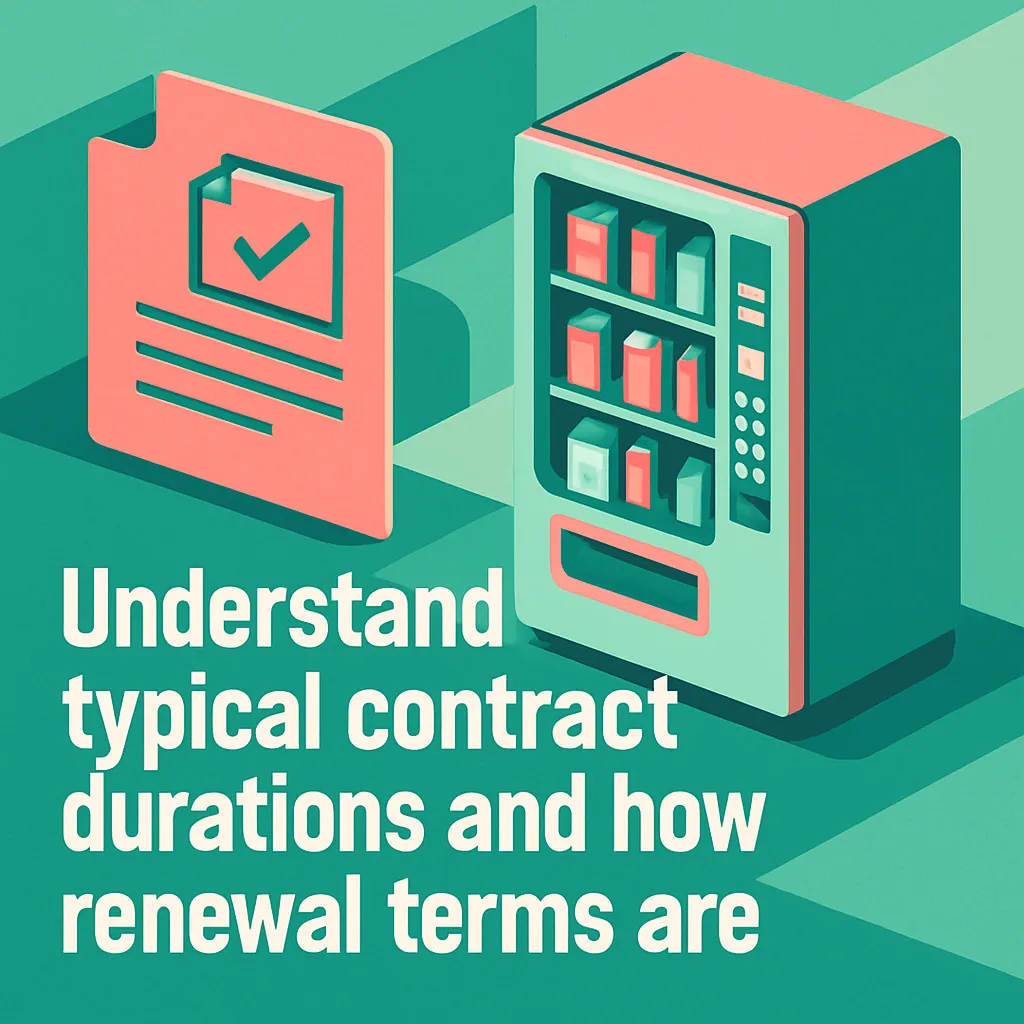Vending Contract Lengths and Renewals
Understand typical vending contract durations and how renewal terms are structured to make informed decisions.
Back to Vending Contracts ResourcesUnderstand typical vending contract durations and how renewal terms are structured to make informed decisions.
Back to Vending Contracts ResourcesUnderstanding the nuances of vending contract lengths and renewal options is crucial for any business, ensuring flexibility and long-term satisfaction.
![]() Evaluate pros & cons of short vs. long contract terms
Evaluate pros & cons of short vs. long contract terms
![]() Learn about automatic versus explicit renewal processes
Learn about automatic versus explicit renewal processes
![]() Discover key negotiation points for favorable terms
Discover key negotiation points for favorable terms

When incorporating vending services into your business, the contract agreement is as crucial as the machines themselves. A well-understood contract ensures clarity on service levels, equipment, and crucially, the duration of the agreement and its renewal conditions. It’s important to review every clause carefully to safeguard your business interests and maintain flexibility.
Vending contracts typically vary in length, commonly ranging from one to five years. Shorter contracts, often one to two years, can be beneficial for new businesses or those wanting to test vending services without a long-term commitment. They offer flexibility to change vending providers or negotiate new terms if initial expectations aren't met. Conversely, longer contracts, usually three to five years, often come with incentives such as newer equipment, better pricing, or a wider product selection, and can provide greater stability in service and budgeting.
Many vending contracts include renewal clauses, which can either be explicit (requiring an active agreement to renew) or automatic. Automatic renewal clauses are common but require careful attention. These clauses typically state that the contract will automatically extend for another term (e.g., one year) unless you provide written notice of non-renewal within a certain window, such as 60 or 90 days before the contract's end. Missing this window can bind you to another term, even if you are dissatisfied with the service. Always be aware of the "notice period" to avoid unintended renewals. Delve deeper into specific clauses by reading about termination clauses and their implications.
Remember that most aspects of a vending contract are negotiable. This includes the contract length, the renewal terms, commission rates, and service frequency. Don't hesitate to discuss your specific needs and preferences. For instance, if you anticipate significant changes in your business operations, you might push for a shorter term or a more flexible early termination clause. Understanding how to negotiate your contract is a valuable skill in this process.
Carefully evaluating contract lengths and renewal terms protects your business from unforeseen obligations and ensures your vending services continue to meet your evolving needs. Always review the full agreement before signing, and consider seeking advice if any terms are unclear.
Vending contract lengths typically range from one to five years, though shorter or longer terms can be negotiated based on specific needs.
Renewals can be automatic, requiring notice to cancel, or require active renegotiation and signing of a new agreement. Always check your contract terms.
Longer terms can offer price stability, potentially better equipment, and reduced administrative overhead for both parties.
Shorter contracts offer more flexibility to adjust to changing needs, test different service models, or exit an unsatisfactory arrangement sooner.
Pay attention to automatic renewal periods, required notice for non-renewal, and any conditions that may change upon renewal, like pricing or service levels.
Yes, almost all aspects of a vending contract, including length and renewal terms, are negotiable to fit the specific requirements of your location.
If proper notice isn't given, the contract typically renews for the specified term, obligating you to continue service under the existing terms.
It's advisable to begin discussions 90-120 days before the contract end date. This allows ample time for negotiation or seeking alternative options.
Many vending contracts include exclusivity clauses, meaning only one provider can operate on your premises. This varies by agreement and can be negotiated.
For multiple locations, look for consistent terms, centralized billing, and flexible equipment options across all sites to streamline management and service.